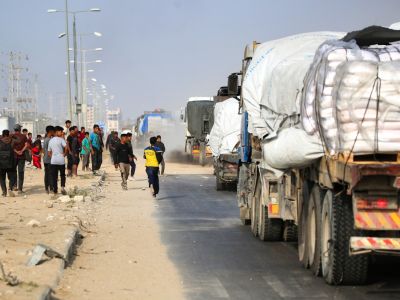The leader of Israel's rightwing opposition, Ariel Sharon, said Wednesday he did not rule out further negotiations with Prime Minister Ehud Barak on forming a national emergency government.
"If circumstances require it and there is urgency (the talks) can start again," Sharon told a news conference in Jerusalem.
Discussions between Barak and Sharon on forming such a government, ostensibly to deal with the situation in the Palestinian territories, broke up last week after the ultra-orthodox Shas party offered Barak's minority administration a "safety net" in parliament.
"Barak rejected it at the last minute for small political manipulation," Sharon added, suggesting that the prime minister had probably come under pressure from leftist members of his Labor party.
"This government has no majority and is coming to an end, in one, three or five months," he predicted.
The government coalition now is made up of just some 30 of the 120 deputies in the Knesset, or parliament, and the talks with Sharon were seen by critics as more concerned with saving Barak's political life than dealing with the Palestinians.
Sharon declared Tuesday his intention to do everything he could to topple the government, but opinion polls show former prime minister Benjamin Netanyahu, Sharon's predecessor as head of the opposition Likud, better placed to beat Barak in the event of new elections.
Sharon said that Likud would back the current administration, "as long as the government takes the steps needed on security, and as long as there is no move to divide Jerusalem".
The Likud leader criticized Barak for wanting to keep to the line established by the failed Camp David summit in July in the United States.
According to the Israeli media, Barak was open then to discussing Palestinian Authority control over a part of the Arab areas of Jerusalem, a pullout from almost all the Jordan valley, some kind of right of return for refugees, and dismantling of Jewish settlements.
"Likud involvement in the government is not an obstacle to peace, but will contribute to peace," Sharon claimed.
"I don't think the peace process is dead, but it should be conducted on a different line," he said.
The opposition leader said he envisaged a "long-term interim agreement without a timetable, but (with) a list of recommendations," such as a halt to incitement to violence.
Under such an agreement, Sharon said Jerusalem should remain the unified capital of the state of Israel, and that Israel would keep control of the Jordan valley, up to the border between the West Bank and Jordan.
The Palestinians want to make east Jerusalem, which was annexed by Israel following its capture in 1967, the capital of their future independent state.
Sharon's controversial September 28 visit to the east Jerusalem mosque area, the third holiest site in Islam, which sits on Temple Mount, the holiest site in Judaism, sparked the current wave of violence throughout the territories.
Violence since then has left at least 163 dead and thousands injured, nearly all Palestinians.
But Sharon said that the violence was "pre-planned" and would have happened anyhow.
"They would have found another way for it," he said -- JERUSALEM (AFP)
© 2000 Al Bawaba (www.albawaba.com)









